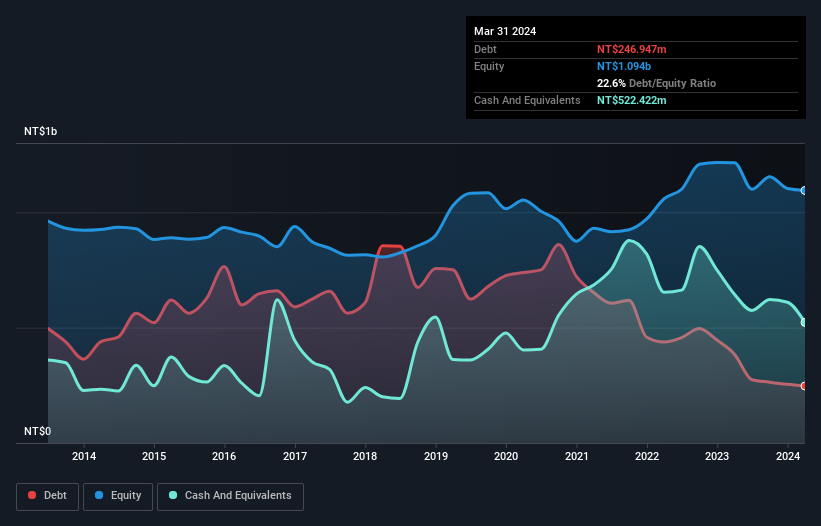- Taiwan
- /
- Electronic Equipment and Components
- /
- TWSE:3535
Health Check: How Prudently Does Favite (TWSE:3535) Use Debt?
Warren Buffett famously said, 'Volatility is far from synonymous with risk.' So it might be obvious that you need to consider debt, when you think about how risky any given stock is, because too much debt can sink a company. We can see that Favite, Inc. (TWSE:3535) does use debt in its business. But the more important question is: how much risk is that debt creating?
When Is Debt A Problem?
Debt assists a business until the business has trouble paying it off, either with new capital or with free cash flow. In the worst case scenario, a company can go bankrupt if it cannot pay its creditors. However, a more usual (but still expensive) situation is where a company must dilute shareholders at a cheap share price simply to get debt under control. Of course, the upside of debt is that it often represents cheap capital, especially when it replaces dilution in a company with the ability to reinvest at high rates of return. When we examine debt levels, we first consider both cash and debt levels, together.
Check out our latest analysis for Favite
What Is Favite's Net Debt?
As you can see below, Favite had NT$246.9m of debt at March 2024, down from NT$385.0m a year prior. But on the other hand it also has NT$522.4m in cash, leading to a NT$275.5m net cash position.

How Strong Is Favite's Balance Sheet?
The latest balance sheet data shows that Favite had liabilities of NT$347.5m due within a year, and liabilities of NT$214.7m falling due after that. On the other hand, it had cash of NT$522.4m and NT$345.7m worth of receivables due within a year. So it actually has NT$306.0m more liquid assets than total liabilities.
This short term liquidity is a sign that Favite could probably pay off its debt with ease, as its balance sheet is far from stretched. Succinctly put, Favite boasts net cash, so it's fair to say it does not have a heavy debt load! The balance sheet is clearly the area to focus on when you are analysing debt. But you can't view debt in total isolation; since Favite will need earnings to service that debt. So if you're keen to discover more about its earnings, it might be worth checking out this graph of its long term earnings trend.
Over 12 months, Favite made a loss at the EBIT level, and saw its revenue drop to NT$333m, which is a fall of 74%. That makes us nervous, to say the least.
So How Risky Is Favite?
While Favite lost money on an earnings before interest and tax (EBIT) level, it actually generated positive free cash flow NT$68m. So taking that on face value, and considering the net cash situation, we don't think that the stock is too risky in the near term. With mediocre revenue growth in the last year, we're don't find the investment opportunity particularly compelling. There's no doubt that we learn most about debt from the balance sheet. However, not all investment risk resides within the balance sheet - far from it. For instance, we've identified 4 warning signs for Favite (3 are concerning) you should be aware of.
At the end of the day, it's often better to focus on companies that are free from net debt. You can access our special list of such companies (all with a track record of profit growth). It's free.
New: AI Stock Screener & Alerts
Our new AI Stock Screener scans the market every day to uncover opportunities.
• Dividend Powerhouses (3%+ Yield)
• Undervalued Small Caps with Insider Buying
• High growth Tech and AI Companies
Or build your own from over 50 metrics.
Have feedback on this article? Concerned about the content? Get in touch with us directly. Alternatively, email editorial-team (at) simplywallst.com.
This article by Simply Wall St is general in nature. We provide commentary based on historical data and analyst forecasts only using an unbiased methodology and our articles are not intended to be financial advice. It does not constitute a recommendation to buy or sell any stock, and does not take account of your objectives, or your financial situation. We aim to bring you long-term focused analysis driven by fundamental data. Note that our analysis may not factor in the latest price-sensitive company announcements or qualitative material. Simply Wall St has no position in any stocks mentioned.
Have feedback on this article? Concerned about the content? Get in touch with us directly. Alternatively, email editorial-team@simplywallst.com
About TWSE:3535
Favite
Engages in the research and development, manufacture, and sale of automatic optical Inspection (AOI) equipment in Taiwan and China.
Adequate balance sheet with minimal risk.
Similar Companies
Market Insights
Community Narratives



